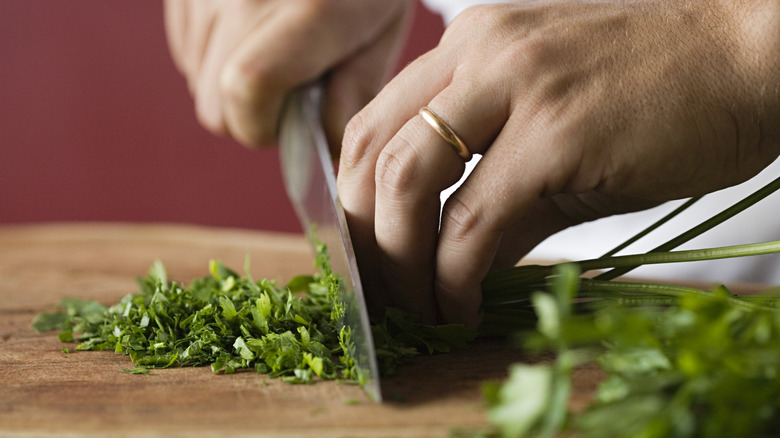The 4 Herbs You Need For A Classic French Fines Herbes Omelet
If you're a fan of classic French cooking, you've undoubtedly admired the way French cooks turn a bowl of whisked eggs into an elegant, softly folded, golden omelet. Every bit as classic is the French go-to choice to season those eggs known as fines herbes – a set of aromatic, soft stemmed herbs used to gently add flavor while still allowing the taste of the eggs to be the star of the omelet. The combination is made up of parsley, chives, tarragon, and one of the most fragile of all herbs, feathery chervil.
Each of these herbs adds its own unique note to the blend, so the flavor is far more interesting collectively than each individual. The grassy taste of parsley, oniony chive, licorice-scented tarragon, and mild chervil with its echoes of parsley sing together like a beautiful herbal choir. What they have in common beside their bright green color is that longer cooking times dim their aroma, so the brief cooking time in a fines herbes omelet not only preserves the hue, but ensures the herbs keep their true flavors.
Tips for getting the most from your fines herbes
It's simple enough to make a fines herbes omelet once you've sourced the herbs — simply chop the herbs and whisk them into your eggs before cooking them. Save a tablespoon or two to sprinkle on the finished omelet if you'd like. Although fresh parsley and chives are abundant in most grocery stores, tarragon and chervil can be tougher to source in the produce aisle. It's worth the hunt for fresh ingredients for this mixture, because the complex flavors of tarragon and chervil are usually lost in the drying process, which also dulls their green color.
Because each of these four herbs have soft, easily-bruised leaves, you should take care not to crush them under something heavy in your shopping cart or get smashed between items in your grocery bag. Be sure to give the herbs a quick rinse when you get home, and store them carefully for the longest shelf life. Of course you can use the leftover herbs for other kitchen projects, too. One of the most practical might just be folding them into a savory compound butter you can use for steaks, or just about anything else you'd like.

